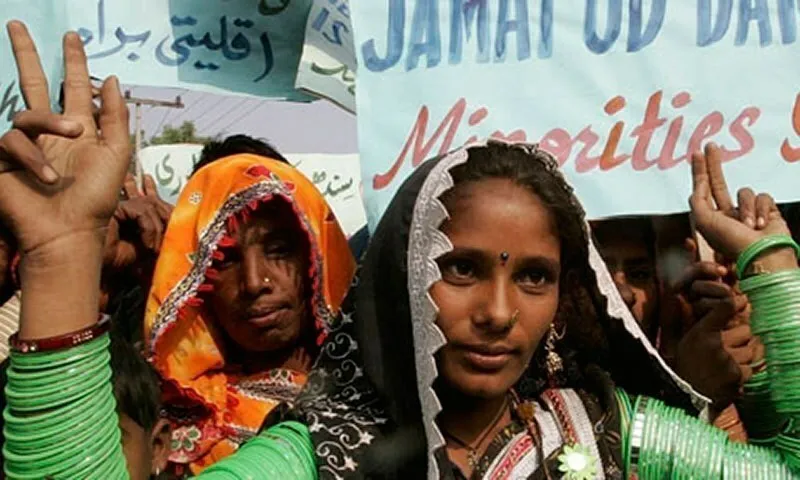Sindh, a land known for centuries as the cradle of tolerance, harmony, and Sufi thought, is now burning in the fire of extremism. Here, innocent Hindu and Christian girls, often between the ages of 12 and 16, are kidnapped and forced to convert to Islam. Families are silenced through intimidation and threats, while state institutions often remain silent. Each year, at least 1,000 minority girls in Pakistan reportedly become victims of forced conversions, with Sindh witnessing the highest number of such cases. This is not only a blatant violation of human rights but also a threat to the cultural diversity and social fabric of Sindh.
These cases have continued to rise even in 2025. In April, a 14-year-old Hindu girl, Teji Thakur, was abducted from a village in Thar and forcibly converted. In May, a minor girl named Moran Bheel was taken to Bharchundi Sharif and forced to marry a man nearly four times her age. In June, three Hindu sisters — Diya, Jiya, and Disha — along with their brother Ganesh, were abducted from Shahdadpur and later recovered from Karachi. Authorities claimed it was a “voluntary conversion”, but the family insists it was coercion. In August, yet another Hindu woman was targeted in Bharchundi Sharif. Such incidents are more common in districts like Tharparkar, Umerkot, Mirpurkhas, Sanghar, Ghotki, and Jacobabad, where minority communities live in constant fear. According to the Pakistan Hindu Council, around 50 Hindu families migrate out of Sindh every month to escape this persecution.
The issue, however, is not solely rooted in religious extremism. Social and economic pressures play a significant role as well. In many areas, girls are still treated as property, and extremist groups exploit this deep-seated patriarchy. Biased content in school curricula fuels prejudice among children from a young age. Although Hindus make up barely 2% and Christians less than 1.5% of Pakistan’s 231 million population, they are frequently targeted. In March 2025, a Christian girl named Muskan was abducted and forced into conversion for nine months, adding to the growing list of such cases.
Legally, Article 20 of Pakistan’s Constitution guarantees freedom of religion, but in reality, this right is routinely ignored. In 2016, the Sindh Assembly passed the “Sindh Criminal Law (Protection of Minorities) Bill” aimed at stopping forced conversions. Unfortunately, due to pressure from religious groups, the bill was withdrawn in 2019. Law enforcement agencies often refuse to register complaints, while victims and their families face constant harassment and threats. Similarly, the Sindh Child Marriage Restraint Act is rarely enforced, enabling forced marriages of underage girls to continue. A 2023 UN report highlighted the rising discrimination against minority communities in Pakistan and criticized the state’s ineffective legal framework. Courts, too, often deliver judgements under pressure, as seen in the cases of Rinkle Kumari (2012) and Reena-Raveena (2019), where despite the victims being minors, their so-called “voluntary” statements were prioritized.
These incidents not only traumatize the victims and their families but also erode the social harmony that Sindh has long been known for. Minority families often live in isolation, struggling with fear and helplessness. Online campaigns like #StopForcedConversions help raise awareness but fail to bring meaningful change without systemic reforms.
To address this crisis, concrete steps are necessary. The conversion of anyone under 18 should be strictly prohibited by law. The 2016 bill should be reinstated and enforced with full legal strength. Police and judicial reforms are essential, along with the regulation and monitoring of religious seminaries. Public awareness campaigns are needed to foster tolerance and protect vulnerable communities. The United Nations has also recommended strong and clear actions to stop forced marriages and conversions in Pakistan.
Restoring Sindh’s tradition of tolerance requires collective effort. Forced conversions are not just a violation of human rights — they are a serious threat to social peace and coexistence. It is time for society, the government, and state institutions to act decisively so that every citizen can practice their faith freely, and no young girl has to live in fear of losing her identity.
